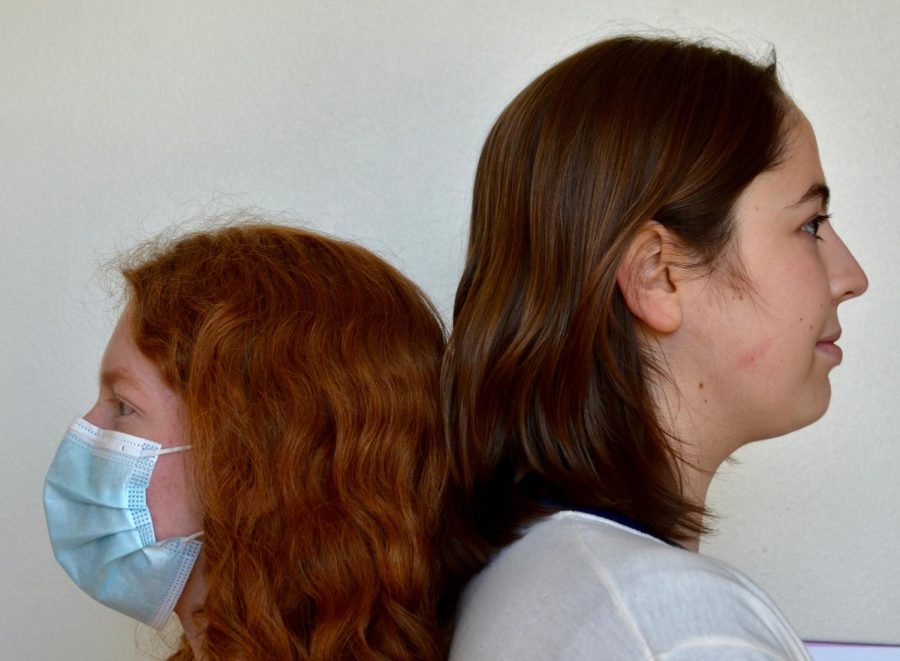Is it over yet?
Recently, COVID-19-related restrictions have eased in Iowa and other parts of the world. Yet, in some countries cases are on the rise. So is the pandemic really over?
The debate continues on masks and the official end to the pandemic.
April 4, 2022
In the last few weeks mask mandates and other COVID-19 regulations have been curtailed or dropped entirely. Overall, Worldwide cases have steadily decreased in recent months. So is the pandemic almost over?
Despite the drastic decrease in cases in the US, there are several other countries experiencing surges in case counts. South Korea has confirmed over 4 and a half million cases of COVID-19 in the last two weeks alone. Other countries in the UK have been experiencing high case counts as well. Concurrently, Germany has confirmed 3 million new cases, Vietnam 1.9 million, France 1.8 million and the UK 1.2 million.
In contrast, the United States has only had 400,000 confirmed cases in the last two weeks. But the surges in other countries could be a cause for alarm.
“Most of the other surges that we’ve seen in other countries have preceded what we’ve seen in the States. We’ve tended to see a similar type of resurgence here after we’ve seen it elsewhere,” said David Stoltz, Director of pulmonary and critical care medicine at the University of Iowa.
However, no matter how much information we have about the current case counts in other parts of the world, it is extremely difficult to predict what effect these cases will have here in the US and in Iowa. Furthermore, an increase in cases may not translate into more hospitalizations and deaths.
“With all the prediction models and data collected, we still don’t understand why SARSCoV2 variants come and go, and what causes waves of infection in this pandemic. Then again, we haven’t figured out why influenza is seasonal either, which has been plaguing humans a lot longer. We do know that for COVID-19, vaccination and previous infection can help to prevent bad outcomes like hospitalization and death,” said Matthew Kuehnert, MD, an infectious disease consultant in New Jersey.
In the event of another COVID-19 surge in Iowa, we might be better off than previously, because many people have been exposed to the virus, and thus have had a better chance of developing some level of antibodies against the disease.
“Our hope is that [a future] surge will be less significant. With the last Omicron surge, many people became infected, even those who were vaccinated. So I think we probably do have a significant level of immunity in the population that may minimize the degree of the surge,” said Stoltz.
Public health officials also have more information about the COVID-19 virus than they did at the beginning of the pandemic and during other surges.
“If there is a new surge in the number of cases, I think we’ll be better prepared with readily available testing and hopefully antiviral agents will be readily available, especially for those at higher risk of severe disease,” said Judy Streit, director of the Division of Infectious Diseases at the University of Iowa.
Nonetheless, an increase in cases could lead to another round of social distancing and mask mandates. And after these mandates have been repealed, some might not be willing to return to their a life subject to COVID-19 related restrictions, even if we see an increase in cases.
“Everyone in our community is bearing some burden of COVID fatigue, be it from social isolation, job loss, the stress of a work environment where there was risk of exposure or the loss of loved ones from COVID… The move to open up, which has allowed people to re-establish some social ties outside their household, has been so welcome that it may reduce voluntary adherence to future recommendations to re-mask and socially distance,” said Streit.
Even if everyone adheres to safety precautions and protocols, there is still a great deal about COVID-19 that experts still do not know.
“Masks and social distancing have been shown to prevent transmission, but we don’t know how they contribute to ending infection waves. Each person has to have their own tolerance for risk of exposure, and is best an informed decision with information from public health. It’s like driving in the snow…everyone handles it differently,” said Kuehnert.
While COVID-19 appears to be drawing to a close, COVID-19 may become endemic, with seasonal increases, similar to influenza and other respiratory infections.
“Most people would say that a viral outbreak like this becomes endemic when it becomes predictable, in terms of what it’s gonna do throughout the year, what its seasonal pattern is, how many people will it affect in a typical year, what will be the health consequences, how severe are those consequences?… I don’t think we quite know yet. I think it will become endemic at some point, but I suspect we’re probably still little ways away from that,” said Stoltz.











